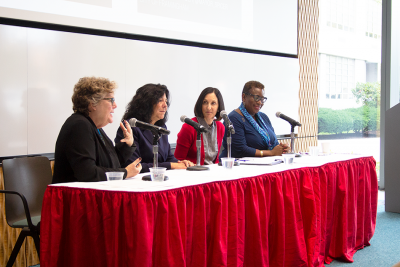From being asked if they’re someone’s wife, to being asked to get the mayor — when they are, in fact, the mayor — local policymakers in Massachusetts came together Tuesday to break down just how far women have actually come in politics.

The discussion, hosted by the IOC at the Center for Integrated Life Sciences and Engineering, was led by Dr. Virginia Sapiro, a professor of political science, and the Dean Emerita of Arts and Sciences at BU.
The panel consisted of local Massachusetts policy-makers like Framingham Mayor Yvonne Spicer, Newton Mayor Ruthanne Fuller and Newburyport Mayor and BU alumna Donna Holaday, and served as a medium for policymakers to discuss and reflect on women’s role in politics.
“It’s been 100 years since women were supposedly granted the right to vote … we’re still well behind on women and leadership,” Sapiro said. “[There is] nothing better than bringing a number of distinguished women mayors in to talk about those issues and empowerment to find out how far we’ve gone and what more we need to do.”
After a brief introduction, each of the panelists outlined their pathway to mayorship. While they hadn’t dreamt of becoming mayors from a young age, they eventually found the encouragement and bravery to run and win.
Fuller and Spicer are the first female mayors to be elected in their respective cities while Holaday is the first Newburyport mayor to be sworn in for a second term. Each shared their own experiences with gender discrimination in governent, as well as the other struggles they faced getting to where they are today.
Katherine Lusk, co-director of the IOC and host of the event, said the event was a great opportunity for women to hear the perspectives of women in politics.
“By bringing mayors together to share ideas and in a case like this, really it’s an opportunity to expose the BU community and other folks to the perspective of a group of terrific mayors who are women who are really doing wonderful work in their communities,” Lusk said.
The IOC has many initiatives with BU students and faculty to improve the lives of the surrounding communities they work with. A new program, MetroBridge, finds projects in the city for BU students to work on, giving students a way to evoke change and explore their city.
“[The IOC] helps build bridges between Boston University and cities, whether that between faculty, students, or classrooms and communities in the greater Boston region and beyond,” Lusk said.
Katy O’Loughlin, a graduate of BU, said the panel provided insight into local politics.
“Having this panel of local mayors really helps put things in perspective and shows not only the audience, but anyone else … how accessible local politics are and how easy it can be to get involved and showing all the female perspectives is definitely helpful for women involved,” O’Loughlin said.
When asked about the BU community’s reception to women’s empowerment, Sapiro said the campus has given an enthusiastic welcome.
“We have slews of undergraduates who are very involved with [gender issues],” said Sapiro. “ It would be nice to have more, would be nice to have more men, but there are women’s groups all over campus, so I think BU is a very, very lively place for women and gender minorities and all sorts of people.”


















































































































